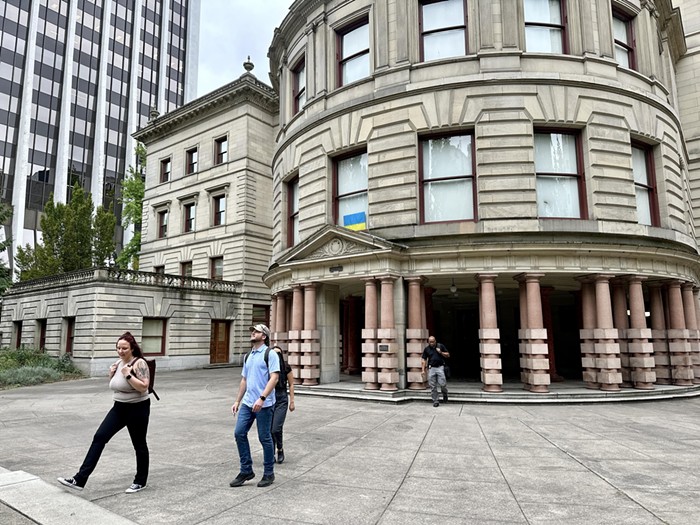
After more than a year of negotiations, the City of Portland, Metro, and Multnomah County have passed a joint policy directing an annual $5.25 million of local tourism tax dollars toward homeless services.
The new policy, spearheaded by Multnomah County Chair Deborah Kafoury, reroutes funds already collected through a 2.5 percent tax on rental cars and hotel rooms in Multnomah County.
In its 18 years of existence, this tax has mostly funded tourism-centric ventures, like constructing a hotel near the Oregon Convention Center (OCC), expanding the OCC itself, and covering operational costs for Portland'5 Centers for the Arts and Travel Portland. But a recent spike in local tourism—paired with an increase in hoteliers raising concerns about Portland's homeless population impacting their businesses—inspired Kafoury to propose sending some of those tourism tax dollars to programs overseen by the Joint Office of Homeless Services (JOHS).
On Thursday, Multnomah County Board of Commissioners passed an inter-governmental agreement dictating the new funding stream, following approval by the Metro Council and Portland City Council.
"We so regularly hear from folks in the travel industry that homelessness is one of the biggest challenges they face in our community," said Multnomah County Commissioner Sharon Meieran. "This is something that just makes so much sense."
The new revenue will fund programs meant to help people who are currently homeless and those at risk of becoming homeless—including mental health and substance abuse treatment, emergency services for people facing eviction, support for homeless youth, and shelter services.
More specifically, these dollars will fund programs that will compliment new affordable housing created by the City of Portland's housing bond, approved by voters in 2016, and Metro's housing bond, approved in 2018. Both of these bonds including "supportive housing," meaning permanent housing that comes with services tailored to keep residents from re-entering homelessness—like drug and alcohol addiction treatment, childcare, job placement assistance, or mental health care.
The agreement acknowledges that "the area’s economic success has not been uniformly shared by the community and a vulnerable portion of the population has been negatively impacted by rapid increases in housing costs." By boosting JOHS' revenue stream, the agreement continues, the region's governments can do three things: Improve conditions for people experiencing homelessness, improve "the visitor experience," and help Portland "remain a desirable travel and tourism destination."
The inter-governmental agreement grants JOHS a starting allocation of $2.5 million for the 2019-2020 fiscal year. That funding will incrementally increase each year until 2023, when JOHS will begin receiving a consistent $5.25 million.
"This took way too long to get done, but it was worth it," said Kafoury at the Thursday meeting. "Because in the end, we’re going to have additional dollars to help people that need it the most in our community."
Kafoury thanked her fellow commissioners and county staff for pushing Metro and the City of Portland to follow through on this agreement. The county spent the past year in discussions with both government bodies to make sure that—in event of an economic downturn—the amount off funding bookmarked for JOHS wouldn't be the first to go. The final agreement guarantees that if the economy tanks, the financial impact will be shared equally across all programs funded by the 2.5 percent tourism tax.
Yet, the new influx of money still won't be enough to bankroll all of the region's needed homeless services.
"While [the new funding] is cause for celebration, it is just one more funding stream for an issue that really demands even more dollars than this," Kafoury said. "We’ll continue to fight to find additional dollars to get people off the streets and into housing."



















